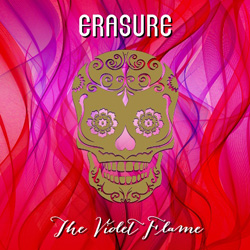 If thrash metal has its “big four” (Metallica, Megadeth, Anthrax, and Slayer), then synth-pop needs to have a “big three.” The members would be Depeche Mode, Pet Shop Boys, and of course, Erasure. While the first two may be the obvious choices, you can’t front on Erasure. Like Megadeth and Metallica, Erasure shares a member with another of the bands (Vince Clarke was a founding member of Depeche Mode), but more importantly, all three bands happened to land at nearly the same time. Even if they didn’t completely change the course of synth pop, then they are surely some of the most influential. And like the “big four,” the bands have endured past their initial splash. For instance, while America may be stuck on Erasure as a 20th century group, the band has just released their 16th album, The Violet Flame (Mute Records).
If thrash metal has its “big four” (Metallica, Megadeth, Anthrax, and Slayer), then synth-pop needs to have a “big three.” The members would be Depeche Mode, Pet Shop Boys, and of course, Erasure. While the first two may be the obvious choices, you can’t front on Erasure. Like Megadeth and Metallica, Erasure shares a member with another of the bands (Vince Clarke was a founding member of Depeche Mode), but more importantly, all three bands happened to land at nearly the same time. Even if they didn’t completely change the course of synth pop, then they are surely some of the most influential. And like the “big four,” the bands have endured past their initial splash. For instance, while America may be stuck on Erasure as a 20th century group, the band has just released their 16th album, The Violet Flame (Mute Records).
Over the course of its nearly 30-year career, Erasure has had an almost automation-like consistency. The formula is simple: Clarke on synths and music and Andy Bell handling the vocals. If you pick up an Erasure album, you know what you are going to get. (The maligned Loveboat excluded.) It may be more or less dance-oriented, but it will always have some fine pop moments. The Violet Flame is a slight return seeing as that their previous release was a Christmas record, last year’s Snow Globe. This go-around they’ve partnered with producer Richard X, who’s worked with artists as varied as MIA and Kylie Minogue. While for some bands that would signal an attempt to reach out to “the kids,” in this instance, it’s simply a case of slight tweaks to the recipe. You can imagine someone in a backroom chomping on a cigar yelling out, “Don’t mess with the formula!”
The Violet Flame is undeniably an Erasure record. While there are some now sounds, at the core is Clarke’s bubbling, gurgling synth lines and Bell’s soaring, dramatic tenor. While on Bell’s solo record, Non-Stop, it seemed as if he had lost an octave or two in his vocal range, The Violet Flame finds him back at full power. And he puts his voice to good use, delivering tunes that are at turns wistful, triumphant, or saturated with longing. While some of Erasure’s contemporaries take a more removed approach, Bell is never afraid to wear his heart on his sleeve.
With so many records under their collective belt and given the consistency of the group, it feels strange to be shocked at just how vital and flat out great The Violet Flame is. There are songs here that can easily be slotted alongside Erasure’s best moments. Actually, strike that. The whole album could be put into that slot. While it may not be as giddy as some folks may like their Erasure, it’s balanced by focused moments that show a sonic and lyrical maturity without being all elder statesmen about it. It’s ironic that since plenty of bands and producers heavily mine the ‘80s, Erasure seems oddly contemporary. Regardless, The Violet Flame shows that great songs will always be in vogue.

Your Comments